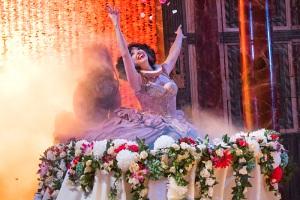A Midsummer Night's Dream review of the Globe Theatre's Wonder Season production
Artistic directors of Shakespeare's Globe are used to igniting controversy: Mark Rylance, great Shakespearean actor that he was, wondered aloud if Shakespeare was actually the author of the plays that are attributed to him, while Dominic Dromgoole was a Shakespeare devotee whose own personal writing includes a memoir Will and Me: How Shakespeare Took Over My Life in support of the Bard.
But Emma Rice, who has joined the Globe after running the Cornwall-based touring company Kneehigh that is famous for devised works, has gone a stage further: she has admitted that she's not even that familiar with the repertoire. She's only directed one before — Cymbeline, for the RSC — and not read much of the rest: "I get very sleepy and then suddenly I want to listen to The Archers," she told The Guardian soon after she was appointed.
So all eyes and ears were on her inaugural production at the helm of the Globe. And its clear from the very beginning of A Midsummer Night's Dream that things are going to be different — very different — from here on in. For a start, there's lighting — yes, real theatre lighting, not just a general state of white light that attempts to recreate daylight (the conditions that Shakespeare's plays would have originally been seen in) and leaves burning house-lights on throughout the show. And there's amplification!
In a (non-Shakespearean) prologue of notes to the audience, we're advised that they're all for original practices at the Globe, but ask the audience to refrain from public urination and spreading syphilis. But this production turns out to be about something else: spreading contagious joy. The Globe has always been a wonderfully democratic space where a tightly packed audience of standing groundlings — paying just £5 a ticket — are the heart of a show; if it works for them, the pleasure spreads in waves to those sitting in the more privileged galleries.
Here, with the playing space continuing into the yard on large white tables and the roof festooned with large white balloons, there's a spirit of playfulness and fun throughout. Rice has made some significant interventions — the mechanicals, apart from Bottom, are an all-female troupe; while Helen has become Helenus, a man, giving a fertile new underscoring to the closeted romance that Demetrius pursues with him — and the mischief-making of Puck that has Lysander also fall for him.
Purists may squirm — and at one point, one of the mechanicals cries, "why is everyone so obsessed with text?" — but actually the spirit of Shakespeare's glorious forest romance is wonderfully engaged and engaging. That's thanks to the freshness and vivacity of the lovers, beautifully played by Ncuit Garwa and Ankur Bahl (Demetrius and Helenus) and Edmund Derrington and Argana Vasan (Lysander and Hermia).
The mechanicals are also charmingly led by Ewan Wardrop's Bottom, and make the play they perform for the Court genuinely hilarious. Cabaret star Meow Meow's Titania may be one eccentricity too far — her accent is extremely odd — but Zubin Varla's Oberon brings back a proper gravitas.
I loved it— its one of the most irreverent, original and all-out happiest Globe shows ever.
Originally published on
